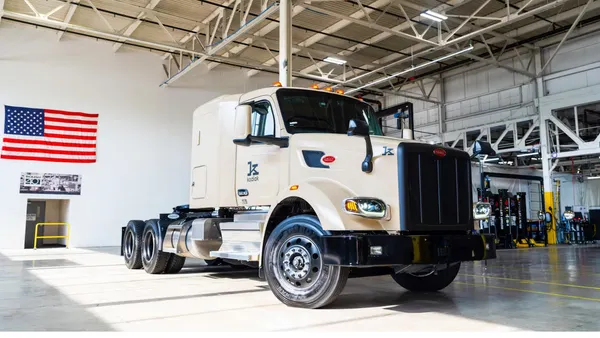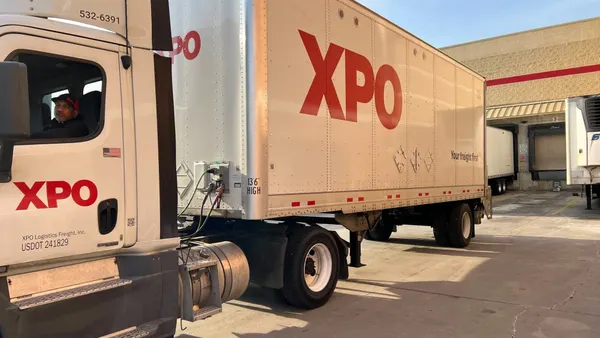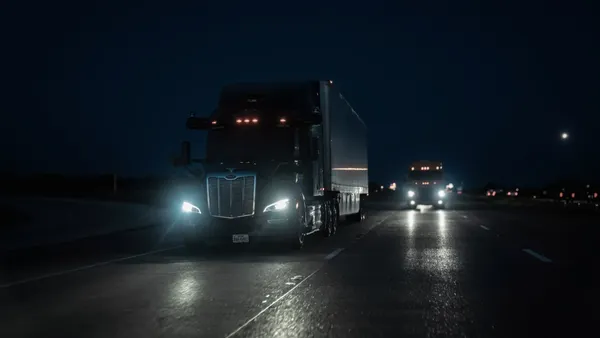Dive Brief:
- Up to 45% of the transportation industry's operating profits could be eroded by the end of 2020, according to Deloitte estimates. That would amount to $30 billion.
- In the mid-March early days of the pandemic-driven downturn, "$160 billion of US-based transportation companies’ market value had been destroyed," according to a company report. Deloitte estimates almost 25% of transportation companies are working urgently to maintain liquidity to withstand the pandemic.
- "Despite [COVID-19's] unfortunate challenges, there are opportunities for transportation companies to emerge stronger than before — particularly if they choose to address longstanding sector challenges," Erich Fischer, principal at Deloitte Consulting, told Transport Dive in an interview. According to Deloitte, those challenges are: lack of investment in new technologies; customer expectations; inefficiencies and congestion from inflexibility and changing trade patterns; sector fragmentation; workforce; and disruptive entrants.
Dive Insight:
"The issue is not the shape of the recovery, but what should be done regardless of the recovery shape," Fischer said. "And there are tangible decisions to be made to address known uncertainties in the sector."
According to Deloitte, unknown certainties include attitudes toward social distancing, bankruptcies and M&A, trade, winning business and last-mile models, regulations, and other areas.
Known certainties, on the other hand, encompass many of the industry's longstanding challenges — including the need for new technologies, for internal operations and for interfacing with customers and partners. In a 2019 Deloitte survey, nearly half of participants from billion-dollar transportation companies said they were not taking advantage of technology and data to address customer expectations, infrastructure limitations, regulatory and other pressures.
With a known certainty, "the question is not whether a company should address, but how much and how fast to address it," Fischer said.
Fragmentation, one of the longstanding challenges in the industry, has been a barrier to quick technology adoption, as has mindset, Fischer said. Fully leveraging technology and data requires a "collaborative ecosystem," he said, whereas the trucking mindset "has traditionally been viewed as a set of linear handoffs and transactions." Competitors stay siloed. But he pointed to smart ports as an example of a shift in that mindset.
Interoperability and data cleanliness and standardization have also been barriers, Fischer said. Cost and firms' lack of exposure to emerging technology, which used to be a significant challenge, have greatly subsided. The reductions in operating and capital expenditures associated with cloud solutions have "been pretty tremendous," he said.
Artificial intelligence (AI) has been growing in the industry for the past few years, as well. In 2017, the global market for transportation-related AI was between $1.2 to $1.4 billion, according to research by the World Bank. But experts recently told Transport Dive it's still early days for AI adoption and development in the industry.
Investing in technology is not possible for all trucking firms, at this moment or any. Not every company has the same finances as Schneider, which announced a strategic investment in TMS startup Mastery Logistics.
In its report, Deloitte noted three strategies with which firms could respond to the economic downturn, based on financial strength. The weakest companies should look to liquidity management; stronger companies should use that strategy and add margin improvement. Deloitte advised that even stronger companies should use strategic investment, and companies of all financial strengths should employ tax strategies.
Regardless of trucking firm size, companies should address some known or unknown certainties, Deloitte said. Even during the pandemic, there are opportunities to "leap ahead."
"For those companies with the financial wherewithal, and the willingness to do, hunkering down and waiting for the crisis to pass is not a winning strategy," Fischer said.










